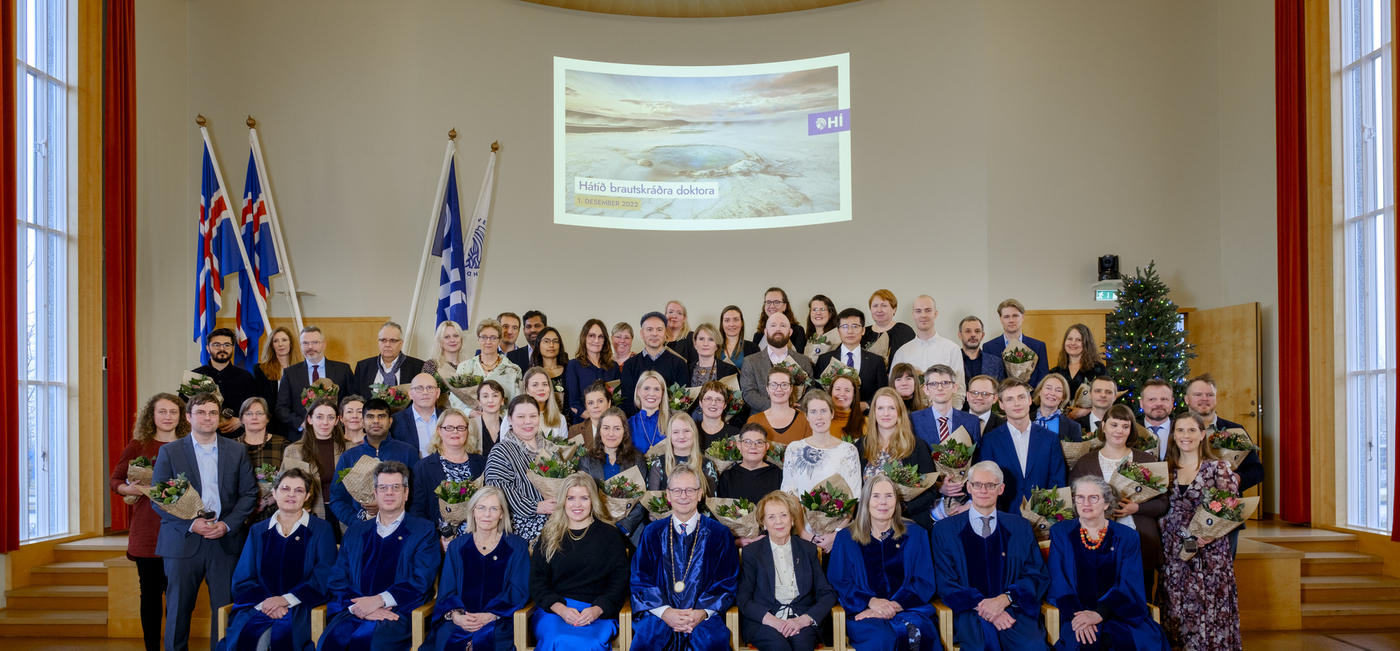The University of Iceland celebrates the 86 doctoral candidates that have completed their PhD in the past 12 months at an annual Ceremony for Doctoral Graduates that took place earlier today. This is the second largest group of doctoral candidates to complete a PhD in one year. Present at the ceremony were Vigdís Finnbogadóttir, former President of Iceland, and Áslaug Arna Sigurbjörnsdóttir, Minister of Higher Education, Science and Innovation, who also addressed the guests.
The Ceremony was now held onsite with guests for the first time in three years. The ceremony was cancelled in 2020 and last year only the doctoral candidates could attend, deans of schools, rector and pro-rectors with the President of Iceland, but this year guests could also attend. The 86 doctoral candidates, who received the University's gold medal at the ceremony today, all graduated from the University of Iceland from 1 December 2021 to 1 December 2021. They graduated from all of the University’s five schools; 40 men and 46 women. Joint degrees with international universities are four in total, and this year a candidate completed their PhD jointly from two University Schools. Twenty nine percent of the candidates have a foreign nationality.
The University of Iceland reach a milestone last May when the number of doctorates awarded reached a thousand. The defence took place largely online, reflecting the changes and the opportunities the corona pandemic had on university operations.
By tradition the president of Iceland, Guðni Th. Jóhannesson addresses the ceremony, however, he could not attend the ceremony today. Áslaug Arna Sigurbjörnsdóttir, Minister of Higher Education, Science and Innovation, was however present both congratulating and encouraging the doctoral graduates. “It is worth celebrating that this remarkable institution – the University of Iceland – one of the main pillars of our sovereignty – reached a milestone last May when the thousandth doctoral defence took place, in just over 110 years. There are only six years since the 500th doctoral candidate defended their thesis which shows clearly the determination and ambition of the university in strengthening research and becoming more prominent among higher education institutions in a global context,” said the Minister.
Furthermore, one of the doctoral candidates, Rúna Sif Stefánsdóttir, doctor in sport and health sciences, addressed the ceremony on behalf of the post docs. In her talk she pointed out that even though this chapter was completed by the group of doctoral candidates, another one, based on the previous one, was just beginning. “So we leave here with new knowledge which we will build upon in our endeavours in society and industry. Our PhD degree is thus a key to further winnings, not only for us in this room but for society as a whole as it constantly requires new knowledge to tackle new challenges, said Rúna.
Dynamic doctoral studies strengthen our global standing
"Dynamic doctoral studies at the University of Iceland have strengthened our position as an internationally recognised research university. PhD programmes at UI are in high demand, from both domestic and international students, and thesis projects are often completed in collaboration with international partners. Doctoral studies also enable the University to fulfil its role as the largest and most comprehensive university in Iceland, an institution that graduates students at all levels of study from five schools and 26 faculties. This is very important as research and solid and diverse education are usually considered the foundation of economic growth and prosperity," say Jón Atli Benediktsson, rector of the University of Iceland, and Guðbjörg Linda Rafnsdóttir, pro-rector for science in their address in the booklet published on this occasion. The booklet includes an overview of all graduated doctors from 1 December 2021 to 1 December 2022 with various tidbits on the development of doctoral studies at the University.
The University of Iceland is particularly proud of this accomplished group; who have already found their places in a broad range of roles throughout society, and indeed throughout the world.




